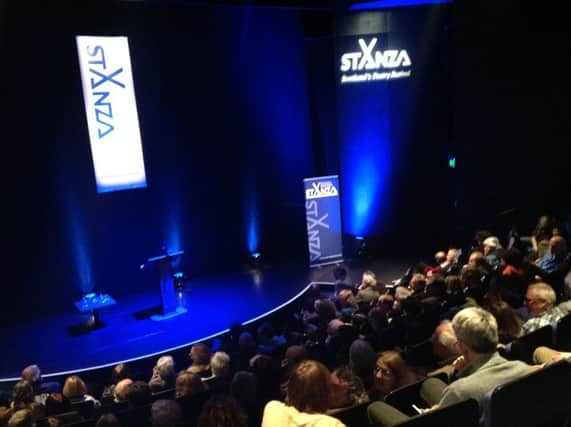The international language of poetry


With Edinburgh in full festival swing this month, I have enjoyed a selection of what’s on offer and also various events and connections which refer back to this year’s StAnza festival in March. The two themes at StAnza 2014 – Words Under Fire, and A Common Wealth of Poetry – caught the moment very well, from the launch by Louis de Bernières, featuring the American Iraq veteran Brian Turner, to the festival finale, and many poets from the Commonwealth took part in readings and exhibitions.
I introduced two past-and-present sessions, both reflecting on the poets and poetry of the two world wars of the 20th century. The first featured Lesley Duncan discussing Charles Sorley and Hamish Henderson, and Ian Higgins discussing the French poet Albert-Paul Granier. I have previously read Sorley’s poetry, and I was fortunate to know Hamish Henderson personally, but I hadn’t encountered Granier before preparing for this session. His poetry was a revelation to me, and I recommend it highly.
Advertisement
Hide AdAdvertisement
Hide AdThe second session featured Stephen Raw’s account of the life and poetry of Wilfred Owen, and Gill Plain’s discussion of the women poets of the First World War. I had enjoyed Stephen’s exhibition in the Council Chambers, and his talk was no less illuminating.
Gill’s talk revealed to her audience the shameful gender imbalance in published anthologies of First World War poets, and has made me want to read more of the work of Vera Brittain and many others. David Constantine’s wonderful StAnza Lecture discussed First World War poetry in English, German and French and this lecture will shortly be going live in the “Afterwords” section of the StAnza website (www.stanzapoetry.org).
The StAnza Festival felt very special this year. For one thing it was great to be back in the Byre Theatre, after our emergency re-location in 2013. It seems to me there’s a synergy between the building and the Festival; it just feels right to be there. StAnza makes good use of all the spaces available in the building – main auditorium, studio theatre, foyer, exhibition areas, bar, café and performing spaces. It provides all the right opportunities for formal readings, events and the informal and friendly mixing of poets and audience members that’s always such a feature of the Festival.
It had started with a bang too, with a wonderful performance of Rime by Square Peg Theatre, a re-telling of The Rime of the Ancient Mariner in music, dance, theatre and acrobatics. It was just astonishing, and played to a near-capacity audience. Many of us have since re-read the poem in the light of the performance.
On the lighter side, but equally essential in my view, there were Poetry Café sessions from American and UK poets. The Open Mic sessions were highly entertaining opportunities for poets from the audience to mix it with established writers, and the workshops and the Round Table sessions were as popular as ever.
On the Sunday afternoon StAnza launched the Poetry Map of Scotland. Sixteen poets read poems on specific Scottish places with two more joining us by Skype. This project has now been rolled out online, using the StAnza blog and a map application.
Readers at the Poetry Centre Stage events in the auditorium presented an international galaxy of well-known figures in the poetry world. I hugely enjoyed readings from David Constantine, Brian Turner, John Burnside, and Tishani Doshi. Poet Laureate Carol Ann Duffy was accompanied by multi-instrumentalist John Sampson, and TJ Dema from Botswana gave an electrifying performance. The final evening featured outstanding sessions from Menna Elfyn and Paul Muldoon, in a fitting end to the Festival.
A notable feature of StAnza is the number of connections between poets which are forged or developed each year. These links are one of StAnza’s enduring legacies within and across borders. The festival itself is one member of a growing network of poetry festivals which help to promote poets and poetry throughout the world. Festival director Eleanor Livingstone has played a significant part in developing this network.
Advertisement
Hide AdAdvertisement
Hide AdSome of the events, exhibitions, talks and photographs are now available in the Afterword section of the website, so StAnza 2014 hasn’t really finished, and a series of innovative projects ensures that it continues to celebrate poetry on a year-round basis.
• Colin Will is chair of the StAnza Board of Trustees
SEE ALSO